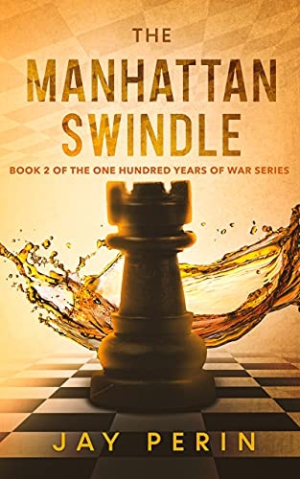The Manhattan Swindle
A Historical Political Saga: Book 2 of the One Hundred Years of War Series
In the thriller The Manhattan Swindle, former partners are caught up in family politics, even as they work to come into their own adulthoods.
In Jay Perin’s historical thriller The Manhattan Swindle, rival families set a political power play in motion, hoping to unseat a ruthless oil baron.
The Kingsleys and the Shepards have built up dynasties in 1970s America. The families are rivals, but they’ve settled into an alliance against a larger threat: Jared Sanders, who made a covert attempt on the life of one of the families’ heirs, Harry. In the aftermath of Sanders’s attack, Harry and Lilah, his once partner, go in separate directions, though they’re sometimes pulled together again—in part because the families have decided that Lilah should rule Sanders’s empire, once he’s deposed.
This series title builds upon previous events in major ways, improving upon earlier characterizations and behind-the-scenes machinations in the process. Harry and Lilah’s traumas play a pivotal role; they are contextualized well, as are Sanders’s and the families’ moves. Still, what came before is vital to understanding the decisions made in this series entry.
Harry and Lilah anchor the volume, which sprawls across more than a decade’s worth of time. Harry’s idealism propels him to join the Navy SEALs; Lilah confronts her own ambitions alone. Though their romance survives Sanders’s violent acts, the Kingsley-Shepard movements threaten their relationship, too. Their bond is strained; still, their emotional struggles are engaging, thanks in great part to their intriguing conversations, which graduate from tender, dramatic proclamations of love into vicious bantering as they move in their own directions. They remain in each other’s orbits, interrogating their changing feelings for each other throughout the book.
Less involving is the book’s rotating series of historical backdrops—and the Kingsley-Shepard plot. These elements seem to belong to a different story than Harry and Lilah’s tale. And the book’s secondary characters are not as well developed as the central couple, while the intense, spy-thriller tone is at odds with Harry and Lilah’s connection. Sanders is established as a looming threat, but he’s kept in the shadows until the closing section of the book. His absence is glaring, and the book’s conclusion is flat because of this; still, it establishes a firm basis for understanding the mechanizations of the family empires as they move toward the 1990s.
In the thriller The Manhattan Swindle, former partners are caught up in family politics, even as they work to come into their own.
Reviewed by
John M. Murray
Disclosure: This article is not an endorsement, but a review. The publisher of this book provided free copies of the book and paid a small fee to have their book reviewed by a professional reviewer. Foreword Reviews and Clarion Reviews make no guarantee that the publisher will receive a positive review. Foreword Magazine, Inc. is disclosing this in accordance with the Federal Trade Commission’s 16 CFR, Part 255.

